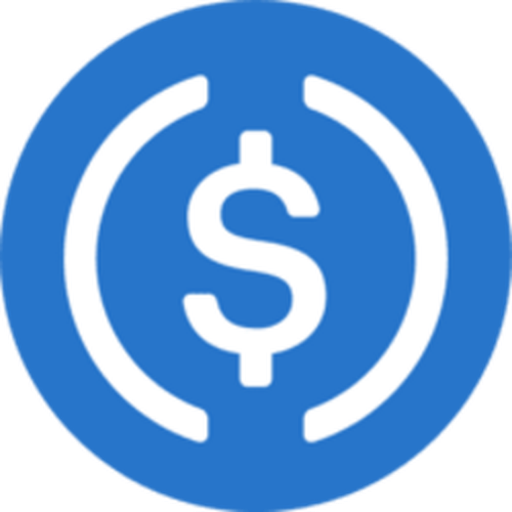USDC vs MimbleWimbleCoin – Price, Market Cap & Performance Compared
Which coin performs better – USDC or MimbleWimbleCoin?
We compare the current price (0.99971 $ vs 36.93 $), market cap (74 153 765 385 vs 405 665 438) and all-time high (1.17 vs 38.81).
Find out which one stands out right now!
USDC is currently trading at 0.99971 $, while MimbleWimbleCoin stands at 36.93 $. These cryptocurrencies differ not only in price but also in market presence.
The market cap of USDC is around 74 153 765 385, and MimbleWimbleCoin has about 405 665 438. Their respective all-time highs are 1.17 for USDC and 38.81 for MimbleWimbleCoin.
Daily trading volume and the 24h price change (-0.00009 % vs -1.72025 %) also offer key insights.
Compare all metrics now and see which coin fits your investment strategy best!
USDC
USD Coin (USDC) is a stablecoin that is pegged to the US dollar, offering a consistent value and reducing the volatility often associated with cryptocurrencies. It provides a crucial bridge between traditional financial systems and digital currency markets, facilitating easy and secure transactions. USDC's foundation on blockchain technology ensures transparency and enhances trust among users and institutions.
more informationMimbleWimbleCoin
MimbleWimbleCoin leverages the MimbleWimble protocol to offer enhanced privacy and scalability features in the blockchain space. Its unique approach enables confidential transactions by obfuscating sender, receiver, and transaction details, appealing to privacy-focused users. As interest in privacy-centric cryptocurrencies continues to grow, MimbleWimbleCoin positions itself as a compelling option for users seeking anonymity and efficiency.
more information

|

|
|
|
|
General Information |
|
|---|---|
|
Title
USDC
|
Title
MimbleWimbleCoin
|
|
Symbol
usdc
|
Symbol
mwc
|
|
Whitepaper
-
|
Whitepaper
-
|
|
Website
|
Website
|
|
Community
-
|
Community
-
|
|
Last Updated
2025-09-24 23:29
|
Last Updated
2025-06-21 06:59
|
Price Data |
|
|---|---|
|
Current Price $
0.99971 $
|
Current Price $
36.93 $
|
|
High 24h
0.99972 $
|
High 24h
37.98 $
|
|
Low 24h
0.99960 $
|
Low 24h
36.18 $
|
|
Price Change 24h
0.00000 $
|
Price Change 24h
-0.64648 $
|
|
Price Change % 24h
-0.00009 %
|
Price Change % 24h
-1.72025 %
|
Market Data |
|
|---|---|
|
Market Cap
74 153 765 385
|
Market Cap
405 665 438
|
|
Total Volume
10 559 655 699
|
Total Volume
200 649
|
|
Market Cap Change 24h
159 815 467
|
Market Cap Change 24h
-7 058 331
|
|
Market Cap Change % 24h
0.21598 %
|
Market Cap Change % 24h
-1.71018 %
|
|
Return on Investment (ROI)
-
|
Return on Investment (ROI)
-
|
Supply and Availability |
|
|---|---|
|
Circulating Supply
74 175 659 818
|
Circulating Supply
10 983 435
|
|
Total Supply
74 172 355 958
|
Total Supply
10 983 691
|
|
Max Supply
-
|
Max Supply
20 000 000
|
Historical Data |
|
|---|---|
|
All Time High (ATH)
1.17
|
All Time High (ATH)
38.81
|
|
ATH Change %
-14.75232 %
|
ATH Change %
-4.91441 %
|
|
ATH Date
2019-05-08 00:40
|
ATH Date
2025-01-31 13:06
|
|
All Time Low (ATL)
0.87765
|
All Time Low (ATL)
0.29873
|
|
ATL Change %
13.90744 %
|
ATL Change %
12 253 %
|
|
ATL Date
2023-03-11 08:02
|
ATL Date
2019-12-05 00:00
|
USDC
Understanding USDC: A Stablecoin in the Volatile Crypto World
USDC, or USD Coin, is a prominent stablecoin in the cryptocurrency market. Issued by Circle and backed by fully reserved assets, USDC is designed to maintain a 1:1 value ratio with the US Dollar, making it a reliable digital dollar. The stablecoin ecosystem plays a crucial role in the broader cryptocurrency industry by providing a less volatile alternative to traditional cryptocurrencies like Bitcoin and Ethereum.
The Evolution of USDC
Launched in 2018, USDC was developed as part of a collaboration between Circle and Coinbase, two major forces in the cryptocurrency space. Since its inception, USDC has seen significant growth and adoption, becoming one of the leading stablecoins alongside Tether (USDT) and Binance USD (BUSD). While its all-time high reached $1.17 in May 2019, this was more of an anomalous spike that reinforced the need for rigorous controls to maintain stability around its intended $1 peg.
Pros of Using USDC
One of the primary advantages of USDC is its transparency and regulatory compliance. Circle, the company behind USDC, undergoes regular audits and publishes monthly attestations of its reserves, ensuring users that each USDC token is truly backed by a dollar or dollar-equivalent asset held in reserve. This transparency fosters trust and helps mitigate the volatility that plagues much of the crypto market.
Furthermore, USDC serves as a bridge between traditional finance and the blockchain world. It's used widely in Defi applications, allowing decentralized lending, borrowing, and trading while maintaining value stability. Additionally, USDC's integration into various wallets and exchanges worldwide adds to its utility and liquidity.
Cons of USDC
Despite its advantages, USDC is not without its drawbacks. One of the critical concerns involves regulatory risks, as stricter regulations on stablecoins could impact its future operations. Also, as a centralized stablecoin, USDC is subject to censorship concerns, where accounts can be frozen, diverging from the decentralized ethos that underlies most cryptocurrencies.
Another drawback is that, unlike decentralized alternatives, USDC requires a level of trust in the issuer, Circle. Any potential mismanagement or economic instability affecting Circle could, in theory, impact its ability to maintain the 1:1 peg, a risk inherent to any centralized stablecoin.
Past Performance and Market Impact
USDC has generally maintained its peg effectively, with minor fluctuations typically remaining within a tight range around $1. Its stability has been pivotal during periods of crypto market volatility, where it serves as a safe haven for investors looking to escape market downturns without exiting the crypto ecosystem.
In terms of market cap, USDC has experienced exponential growth, driven by increased adoption in the decentralized finance (Defi) space and demand for stable trading pairs. Despite being eclipsed by Tether (USDT) in terms of market share, USDC's reputation for transparency gives it a competitive edge.
Future Outlook for USDC
Looking ahead, USDC's future appears promising but laden with challenges. The growing scrutiny from regulators worldwide could result in regulatory changes impacting its operations. However, Circle's proactive approach to compliance and regulation may shield USDC from adverse outcomes.
The stablecoin's role in facilitating seamless transactions and enabling innovative financial products in the Defi space will likely continue to drive its utility and adoption. Moreover, as traditional financial institutions begin to explore blockchain technology, USDC could play a critical role in bridging the two worlds.
In summary, USDC's stability, transparency, and integration with both traditional and decentralized finance systems position it as a key player in the ongoing evolution of digital finance. However, navigating regulatory landscapes and maintaining trust will be crucial for its sustained success.
MimbleWimbleCoin
Understanding MimbleWimbleCoin: An Overview
MimbleWimbleCoin (MWC) is a privacy-oriented cryptocurrency that has garnered interest for its unique approach to transaction confidentiality and scalability. Borrowing its name from a tongue-tying spell in the Harry Potter universe, MWC leverages the Mimblewimble protocol to offer enhanced anonymity and efficiency compared to traditional blockchain architectures.
Historical Development and Performance
Launched in 2019, MimbleWimbleCoin quickly created a niche for itself due to its strong focus on privacy features. The blockchain technology underlying MWC reduces the size of transaction data stored on the blockchain, enabling greater scalability while simultaneously obscuring transaction details, thus preserving privacy.
MWC's highest recorded value was an impressive $31.77, occurring in February 2020. However, like much of the cryptocurrency market, it has experienced fluctuations, leading to a current price of approximately $22.55. The all-time low for MWC was at $0.298733, marking a significant journey for the coin with a dramatic recovery and growth since its inception.
Advantages of MimbleWimbleCoin
One of MWC's standout features is its robust privacy protection. By using the Mimblewimble protocol, MWC ensures that transaction amounts and addresses remain confidential, offering an appealing solution for users valuing privacy.
Additionally, the technology behind MWC allows for a more compact blockchain, which enhances the network’s scalability. This is achieved through a process called "cut-through" in which unnecessary transaction data is eliminated, significantly reducing the blockchain's size.
Drawbacks and Challenges
Despite its innovative features, MWC faces several challenges. Firstly, its privacy-focused protocol, while beneficial for users, may attract regulatory scrutiny. Cryptocurrencies prioritizing anonymity often face hurdles in jurisdictions requiring transparency and adherence to anti-money laundering regulations.
Furthermore, the coin's use case is largely centered around privacy, which might limit its adoption and scalability in other potential applications compared to more versatile cryptocurrencies.
Future Prospects
The future of MimbleWimbleCoin looks cautiously optimistic. Its unique protocol sets a high standard for privacy and scalability, which could see increased demand as privacy concerns grow among users worldwide. However, regulatory developments will be crucial in shaping its adoption and potential integration into broader financial systems.
Investors and enthusiasts should watch for developments in technology upgrades and regulatory policies that could impact MWC's value and utility. With a capped max supply of 20 million, the coin’s scarcity might also play a significant role in its future valuation.
Conclusion
In summary, MimbleWimbleCoin presents a compelling choice for those prioritizing privacy and scalability. Its historical performance highlights significant growth potential, though caution is advised regarding regulatory landscapes that could influence its trajectory. As a part of a market continually evolving with technological innovations and policy shifts, MWC's journey ahead will be one to watch.

